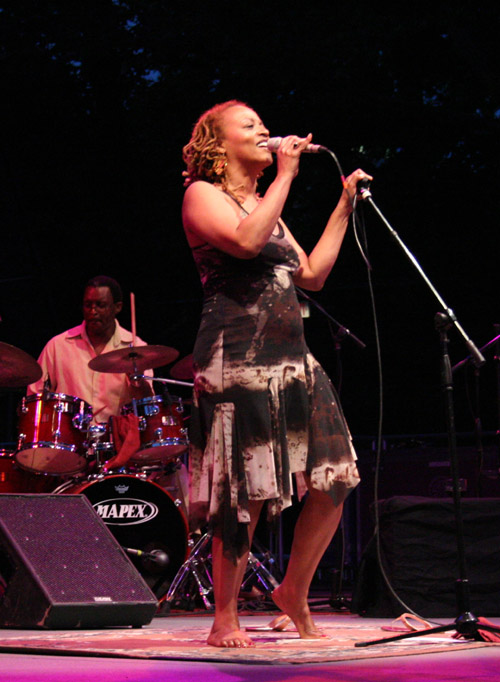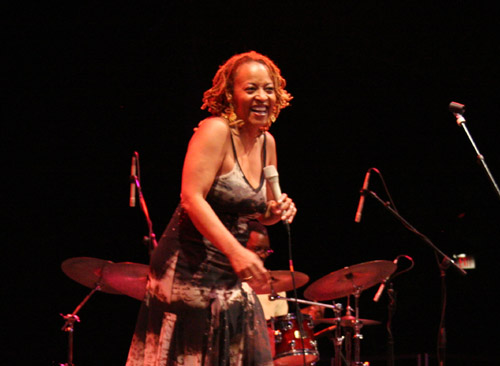Cassandra Wilson, Impromptu
For singer Cassandra Wilson, some of the best music is composed on the fly, and if the entire performance is last-minute, so much the better.

“I’ve always been fascinated by the experimental aspect of music,” renowned vocalist and musician Cassandra Wilson told me less than an hour before she was scheduled to perform at Central Park SummerStage’s season opener. “And there’s a certain synchronicity that happens when a song is really good. Things start coming at you from all kinds of places.”
We were in her dressing room. She wore a spa robe, and I was certain I had interrupted that solitude most artists seek before they take the stage. She sipped from a wine glass and inhaled from a slender cigarette.
I had seen her perform last January at the Stone, composer John Zorn’s venue in Manhattan’s East Village. Wilson and her group played four parts of a 16-piece improvisational project based on Ifa, the Yoruban divination system. That month, saxophonist Steve Coleman had served as a guest curator, bringing in a number of musicians with whom he had collaborated over the years, including Wilson, who first sang on his 1985 album Motherland Pulse. Coleman is widely known for composing music extemporaneously, even while in the studio, an approach that Wilson embraces at times.
“That’s a methodology I’ve kept to this day,” she noted. “You have some songs that are sketched out and some that are framework. And then there are tunes that you create in the studio. There are certain clichés in jazz, and sometimes you get tired of those strict formats. It’s nice to weave in and out of a song in a different way. Steve Coleman had wonderful formulas for figuring out where you are in a song. Maybe there’d be a cowbell lick that’s being played and then you’d know, ‘Oh, we’re back at the top of the tune.’ It’s a great exercise for you to hear something other than the melody to let you know where you are.”
“All of the outcasts knew one another,” Wilson said, chuckling.
Born and raised in Jackson, Miss., Wilson was first exposed to jazz at age five when her father, a bassist, introduced her to Miles Davis’s masterwork Sketches of Spain. Within a year, she had begun formal training in classical piano, and as a budding musician, she taught herself guitar—a tool she often relies on to work through new material. Wilson rarely performs live with the instrument, but many of her records include her guitar work on at least one song. “Find Him,” a folk-blues original from her 1995 album New Moon Daughter, featured her on acoustic guitar, and she enhanced her lovely, harrowing reinterpretation of Jakob Dylan’s “Closer to You” with some fingerpicking on Thunderbird, a 2006 release.
“My father gave me a Mel Bay method book and told me to teach myself how to play the guitar,” she explained. “No one was standing over me, telling me how to do it, so I’ve always had a different relationship with the guitar as opposed to the piano. Playing guitar and singing at the same time requires a lot of focus and concentration. It’s really hard to do because of the style that I play. There’s a lot of emphasis on off-rhythms, so if I’m singing over the top of that, it’s hard to coordinate it all in my head. I’m still trying to figure out a way to do it.”
Throughout her childhood and teenage years, Wilson longed to write and perform music for a living. Her decision to attend Millsaps College was a pragmatic one inspired by her mother’s encouragement to pursue something that provided a more secure lifestyle. She later transferred to Jackson State University, where she earned a mass communications degree, and then landed a job in public affairs at WDSU, a television station in New Orleans. But by the following year, in 1982, she had already begun seeking gigs in New York City clubs.
“I got up here accidentally,” Wilson said. “I was married to a man, Anthony Wilson, whose uncle had just won an election for mayor in East Orange, N.J. So his uncle asked him to come up and work in his administration. I followed my husband and when I arrived, I couldn’t find work in television because I only had a year under my belt as an assistant public affairs director. It was really difficult to break into this market. As a result, I tried to find music gigs.”
This unexpected and fortuitous career twist landed her square in the company of avant-garde artists like Coleman and trumpeter Olu Dara, a fellow Mississippian who was opening for her at this evening’s concert. Wilson met Coleman in the early ‘80s during a Charlie Parker birthday celebration at a club on Manhattan’s Greene Street. They became fast friends and Coleman introduced her to members of his M-Base Collective, an assemblage of talent that included acclaimed pianist Geri Allen and bassist par excellence Lonnie Plaxico. A tireless innovator, Coleman pushed the envelope as far as any of his contemporaries with his incorporation of unconventional time signatures and atonal note sequences. “All of the outcasts knew one another,” Wilson said, chuckling. “By the time I arrived in New York there were just a few places where you could hear avant-garde music—clubs like Sweet Basil, which was the main place. And there were still some gigs uptown in Harlem.”
Suddenly, a frantic knocking on the door interrupted us, followed by the voice of a panic-stricken girl: “Ms. Wilson! Ms. Wilson!”
The door flew open. Pulsating rhythms entered the room.
“Olu’s calling you!” the child exclaimed, her startled expression mirroring that of an astonished Cassandra Wilson.
“Excuse me,” Wilson muttered as she rushed past me.
Moments later I heard the rich, sonorous contours of her contralto accompanying Dara on a song that mixed the Delta blues from their home state with a spiraling jangly guitar riff reminiscent of Nigerian artist King Sunny Ade. Cheers and hearty roars erupted from the audience.
“I went out there with no makeup,” Wilson said when she returned from her impromptu cameo. “It was crazy.”
What’s most salient about the record is the instrumental role of Wilson’s voice. She exhibits a tremendous range and supremely original free-form style.
She looked great, though. And I let her know that.
“You’re crazy,” she replied, settling back into her chair. “Speaking of that scene—the downtown scene—we used to listen to [Olu Dara’s] Natchezsippi Band and his Okra Orchestra at Sweet Basil’s. That was in the mid-’80s. David Murray was down there then. Henry Threadgill’s band was playing. There would be lines around the block. It was a wonderful time for free music.”
Wilson’s appreciation for free music is evident on her 1985 debut album Point of View, which Coleman produced. It’s a collection of loosely structured songs that provide considerable room for the musicians to improvise. But what’s most salient about the record is the instrumental role of Wilson’s voice. She exhibits a tremendous range and supremely original free-form style, meandering through Coleman’s offbeat metric structures and exploring sonic terrain vastly different from her other releases. Wilson’s 1988 album Blue Skies, an assortment of jazz standards, took her in a more traditional direction and broadened her fan base. Projects like New Moon Daughter, which won the 1996 Grammy award for best jazz vocal performance, and Thunderbird, her latest record, synthesize her experimental acuity and brilliant songwriting. Thunderbird, produced by studio guru T Bone Burnett, also makes use of technologies like sampling and programmed beats. Burnett’s work on Thunderbird helped earn him a 2006 Grammy nomination for non-classical producer of the year.
“[T Bone and I] have a lot in common in terms of our approach to music,” Wilson said. “He’s very hands-off. He likes to let the music dictate the circumstances instead of the other way around, and he allows musicians a lot of time to develop ideas. I can’t say enough about how important it is for a musician to be relaxed—to be able to create music and just jam. And T Bone was always in the background. He’s a man of few words. He would just show up magically and say something, maybe a sentence or two, and then disappear. But what he said was always profound, very important. He doesn’t waste words.”
And neither does Wilson. She is a songwriter of the highest caliber, capturing a plethora of experiences and emotions in succinct, visually intense lyrics delivered in ways that maximize their impact on the listener. One moment the focus is the poetic interplay of her language, and then she’s onto exploring the connotations of a single word with her extensive command of the lower register. Every experience is a potential source of inspiration. The Thunderbird album title came from a tarot reading. “Go to Mexico,” the record’s first cut, drew from a myriad of personal recollections.

“I [recall] watching an El Mariachi movie,” Wilson explained. “And I had a friend who had just moved to Mexico. When I got out to California, I actually wanted to go to Mexico because I felt stuck and wanted to do something I had never done before. I have never been to Mexico. That’s why I sing about it.”
Only one song from Thunderbird made it into Wilson’s SummerStage repertoire—her brooding rendition of Blind Lemon Jefferson’s “Easy Rider,” beginning with a striking Marvin Sewell slide-guitar intro with the same eerie premonitory effect as a theremin in a ‘50s horror film. Wilson’s band played without a set list, opting instead to take requests from an audience of more than 5,000 people, a capacity crowd for Central Park’s Rumsey Playfield. And that synchronic component so crucial to the production of great art made its presence known for the duration of the evening—from the new moon lingering above to the splendid collaborative efforts of stalwart musicians like pianist Cyrus Chestnut and bassist Reginald Veal, whose undulating pulse wove a complex rhythmic tapestry with Herlin Riley’s expressive drumming and Lekan Babalola’s percussion wizardry.
Chestnut’s signature high-end wandering breathed exquisite phrasing into every number, but an occasional dark chord complemented the haunting resonance of Wilson’s voice on covers of Jimmy Webb’s “Wichita Lineman” and the Cyndi Lauper-Rob Hyman ‘80s hit “Time After Time.” Wilson further demonstrated her stylistic diversity with bold interpretations of Robert Johnson’s blues classic “Dust My Broom” and Irving Berlin’s “Blue Skies,” songs that showcased her willingness to cross genres and reinvent standards, a unique openness that she attributes to her Southern roots.
“So many of the genres I jump around in have their origin in Mississippi and down South—country, rock and roll, jazz, blues, funk. If you go out to a club in Mississippi, you can hear musicians who have a command of them all. You get a sense of how the field hollers and spirituals mixed in with them, too. You can see and hear it all in Mississippi.”
